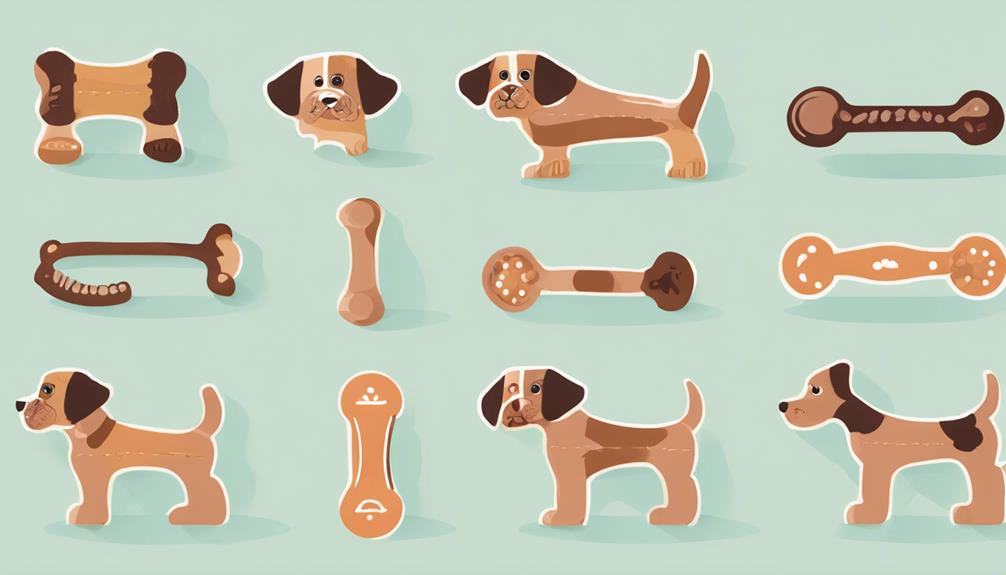How-To Guide: Reasons Behind Your Dog's Chewing Habit
If you've ever wondered why your furry friend seems to have a particular penchant for chewing, you're not alone. Understanding the underlying reasons behind your dog's chewing habit can shed light on their behavior and help you address it effectively.
From teething pains to deeper emotional triggers, exploring these factors can provide valuable insights into your canine companion's world. Uncover the mysteries behind your dog's chewing habits and learn how to support their well-being in a holistic manner.
Canine Teething Process
During the canine teething process, your puppy's baby teeth will start to loosen and fall out to make room for their adult teeth. This natural developmental stage can be uncomfortable for your furry friend, leading to a strong urge to chew. Understanding the teething stages and implementing appropriate remedies is crucial during this time.
Providing teething toys specifically designed for puppies can help soothe their gums and redirect their chewing behavior from destructive habits to appropriate items. Additionally, incorporating training techniques to teach your puppy what's acceptable to chew on can be beneficial in preventing unwanted chewing behaviors in the future.
Behavioral Root Causes
If your dog is chewing excessively, it may stem from behavioral root causes that can be addressed through training and redirection techniques. Environmental factors play a significant role in your dog's behavior. Ensure that your dog has enough toys and appropriate items to chew on to prevent them from turning to furniture or shoes. Utilizing effective training methods such as positive reinforcement can redirect their focus to approved items.
Socialization is crucial in addressing chewing behavior. Dogs that are well-socialized tend to exhibit fewer destructive behaviors like excessive chewing. Take your dog to obedience classes, arrange playdates with other dogs, or visit dog parks to improve their social skills. Additionally, behavioral therapy can be beneficial for dogs with severe chewing issues. A professional trainer or behaviorist can help identify the underlying causes of your dog's behavior and develop a personalized plan to address it effectively.
Stress and Anxiety Triggers
Stress and anxiety can often be underlying triggers for your dog's excessive chewing behavior. Canine anxiety, stemming from various sources such as loud noises, changes in routine, or separation from you, can manifest in destructive chewing habits. Dogs may chew excessively as a coping mechanism for dealing with stress triggers in their environment. For example, if your dog experiences anxiety when left alone, they may resort to chewing as a way to alleviate their nervousness.
It's essential to identify the specific stressors causing your dog's anxiety to address their chewing behavior effectively. Providing a secure and comforting environment, incorporating regular exercise, and establishing a consistent routine can help reduce your dog's anxiety levels. Additionally, seeking guidance from a professional trainer or veterinarian can offer valuable insights and techniques to manage your dog's stress-related chewing issues. By understanding and addressing the root causes of your dog's anxiety, you can help them feel more relaxed and curb their excessive chewing tendencies.
Boredom and Lack of Stimulation
Your dog's chewing behavior may also be influenced by feelings of boredom and a lack of mental stimulation. When dogs are bored, they often resort to chewing as a way to alleviate their restlessness. Providing interactive toys can be a great way to keep your dog mentally engaged and prevent destructive chewing habits.
Interactive toys are designed to challenge your dog's mind and keep them entertained for extended periods. These toys can dispense treats, require problem-solving skills, or offer different textures to keep your dog engaged. By incorporating interactive toys into your dog's daily routine, you can help combat boredom and provide the mental stimulation they need.
In addition to interactive toys, engaging your dog in activities that require mental stimulation can also help curb their chewing habits. Training sessions, puzzle games, or even short walks in new environments can all contribute to keeping your dog mentally sharp and less likely to chew out of boredom. Remember, a mentally stimulated dog is a happy and well-behaved dog.
Natural Instincts and Chewing
When exploring the reasons behind your dog's chewing habit, it's essential to consider their natural instincts and how they influence this behavior. Dogs have instinctual behaviors that drive them to chew. In the wild, chewing is a natural part of a dog's life, helping to keep their teeth clean, jaws strong, and relieving stress.
These instincts can still be strong in domesticated dogs, leading them to seek out items to chew on. Understanding your dog's chewing preferences can give you insight into their natural inclinations. Some dogs may prefer soft toys, while others may lean towards harder objects like bones.
Medical Issues to Consider
Considering potential medical issues is crucial when addressing your dog's chewing habit. Dental problems can often be a significant factor behind excessive chewing behavior in dogs. Issues such as gum disease, tooth decay, or misaligned teeth can cause discomfort, leading your dog to seek relief through chewing. Regular dental check-ups with your veterinarian can help identify and address these issues promptly.
In addition to dental problems, various health conditions may also contribute to your dog's chewing habits. Health issues like nutritional deficiencies, gastrointestinal problems, or neurological disorders could manifest as increased chewing behavior. It's essential to consult with your vet to rule out any underlying medical conditions that might be triggering this behavior.
Age-Related Chewing Patterns

Exploring how age influences your dog's chewing behavior can provide valuable insights into their developmental needs and habits. Senior dogs, for example, may chew more frequently due to dental issues, such as gum disease and tooth decay, which are common in older canines. As dogs age, their teeth may become more sensitive, leading them to chew on softer objects or toys to alleviate discomfort. It's essential to provide senior dogs with appropriate chew toys that are gentle on their aging teeth.
On the other hand, younger dogs who've recently transitioned to adult teeth may experience increased chewing behavior. This phase is crucial for them to explore their new set of teeth and relieve any teething discomfort. Providing appropriate chew toys during this time can help redirect their chewing habits away from destructive behaviors like chewing on furniture or shoes.
Understanding how age impacts your dog's chewing patterns allows you to cater to their specific needs at different life stages, ensuring they maintain good dental health and satisfy their natural chewing instincts.
Training Techniques for Prevention
To deter your dog from destructive chewing behaviors, implement consistent training techniques that redirect their focus onto appropriate chew toys. When applying these methods, remember to use positive reinforcement and redirecting behavior to effectively curb your dog's chewing habit.
Training Techniques for Prevention:
- Positive Reinforcement: Reward your dog with treats or praise when they chew on their toys instead of inappropriate items. This will help reinforce the desired behavior.
- Redirecting Behavior: Whenever you catch your dog chewing on something they shouldn't, calmly take the item away and replace it with a suitable chew toy. Redirecting their focus will teach them what's acceptable to chew.
- Consistency is Key: Be consistent in your training approach. Dogs thrive on routine and will learn faster when training methods are consistently applied.
Frequently Asked Questions
Can Certain Breeds Be More Prone to Chewing Habits Than Others?
Certain breeds may indeed have a genetic predisposition towards chewing habits more than others. However, with consistent behavioral training and proper socialization techniques, you can help manage and redirect this behavior.
Environmental factors also play a role in your dog's chewing habits, so providing a stimulating and engaging environment can help prevent excessive chewing.
How Can Dental Health Play a Role in a Dog's Chewing Behavior?
Dental hygiene is crucial for your dog's overall health and can affect their chewing behavior. Poor dental health may lead to discomfort or pain while chewing, causing your dog to seek relief by chewing on objects. Regular dental care can prevent this issue.
Behavior modification techniques can also help redirect your dog's chewing habits towards appropriate items. By prioritizing dental hygiene and implementing behavior modification strategies, you can positively influence your dog's chewing behavior.
Is It Possible for a Dog to Outgrow Their Chewing Habit?
Yes, it's possible for a dog to outgrow their chewing habit with the right approach. Consistent behavioral training and providing alternatives to chew on can help.
It may take some time and patience, but with your guidance, your dog can learn to redirect their chewing behavior. Encouraging positive habits and discouraging negative ones can help your furry friend break the habit of excessive chewing.
Are There Any Specific Toys or Products That Can Help Redirect a Dog's Chewing Behavior?
If you want to redirect your dog's chewing behavior, there are specific toys and products you can use. Chewing deterrents can help steer your pup away from inappropriate items.
Interactive toys can engage their minds and keep them occupied, reducing the urge to chew on furniture or shoes. By providing these alternatives, you can help your dog develop better chewing habits and protect your belongings.
Can Changing a Dog's Diet Affect Their Chewing Habits?
Changing your dog's diet can impact their chewing habits. Nutrition plays a significant role in your pet's overall behavior. Certain ingredients can affect their energy levels and behavior patterns.
Additionally, some breeds have specific tendencies towards chewing more than others, and adjusting their diet to suit their needs can help address this habit. Consider consulting with a veterinarian to determine the best dietary options for your furry friend.
Conclusion
So, next time you catch your furry friend chewing on something they shouldn't be, remember that there are various reasons behind this behavior.
By understanding the root causes, such as teething, stress, boredom, or medical issues, you can address the issue effectively.
With patience, consistency, and proper training techniques, you can help curb your dog's chewing habit and ensure a happy and healthy pup.
